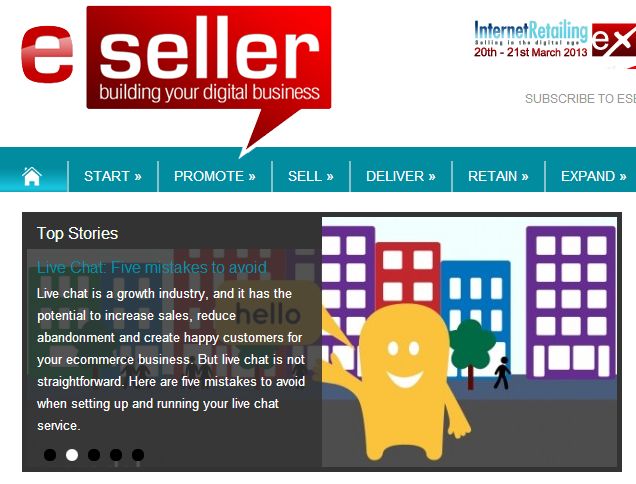The following blog post was originally written for and published by eSeller.
Live chat is a growth industry, and it has the potential to increase sales, reduce abandonment and create happy customers for your ecommerce business. But live chat is not straightforward. Here are five mistakes to avoid when setting up and running your live chat service.
By Andy Soloman, CEO, Yomdel
1. Go beyond standard working hours
When do your customers visit your online store? There will be peak and off-peak hours, but one thing is for sure, your customers will visit you at all times of the day and night.
If sleepless parents with new babies are shopping online at 4am, and if your live chat operators are there to help them when they have a problem, they will love you for it. They won’t expect it, and it will help you create a loyal and happy customer.
2. Forget any idea of doing it "when you can"
One of the great benefits of real-time web chat is just that — it is real time. It means customers expect immediate answers to questions. What happens if your operator is busy doing something else or steps out and forgets to change their status to away?
That’s when you create disgruntled customers and lose sales. If live chat is active on the website, you have to be there to answer questions as and when they are asked. Customers don’t want to send an email or to have their chat request ignored.
If you consider a traditional shop, it would be a bit like a shopper asking a shop assistant a question and then being ignored. That is not customer service, it is customer disservice.
3. Don’t criticise customers for asking "stupid questions"
One ecommerce business owner once told us he had abandoned live chat as he was fed up with people asking “stupid questions". His excuse? The answers were all on the website if people couldn’t be bothered to look he couldn’t be bothered to answer.
It’s a little like the old saying: ‘There’s no such thing as stupid questions, only stupid answers.’ In this instance the stupid answer is arguing that customers are lazy.
Live chat is conversational, you want people to ask questions as you can then engage to help them to complete their purchase and hopefully secure incremental sales on top. Every chat engagement can result in new sales, happy customers, or both.
4. Don’t think people will click the button to request a chat
My mother always said that if you moved house make sure you go at least 80% of the way towards meeting your new neighbours. If you do they will come the other 20% and you will meet. She was right. If you sit at home with the doors closed very few people will come and knock to introduce themselves.
But if you go to them you could find friends for life. The same is true for live chat. It may only be 0.5% to 2% of all visitors to your website that actually request a chat when they have a question. However, if you were to invite people to chat when you think they may need some help they are far more likely to engage.
So, don’t just think reactive click-to-chat, think proactive. Understand how and why people abandon and step in with a nice friendly invitation to help them. They will thank you for it, sales will grow and your business will benefit.
5. Don’t take too long answering questions
When someone asks a question via live web chat they expect an immediate answer. While it is possible for operators to handle multiple chats at the same time, they also have to ensure they are swift with their responses. If they need to go away and find an answer, they should always let the customer know.
If there is going to be a delay in responding they should let the customer know. Whatever happens, under no circumstances leave the customer wondering whether they have been forgotten. Manage expectations carefully.






